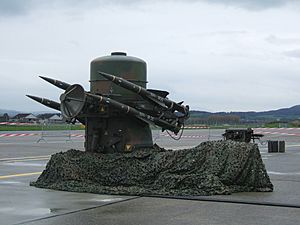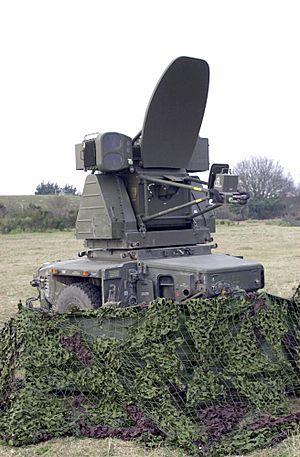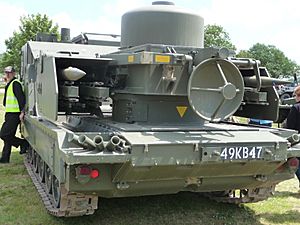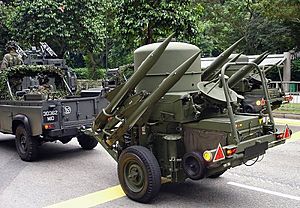Rapier (missile) facts for kids
Quick facts for kids Rapier |
|
|---|---|

A Swiss Rapier.
|
|
| Type | Surface-to-air missile |
| Place of origin | United Kingdom |
| Service history | |
| In service | 1971–present |
| Used by | See users |
| Production history | |
| Designer | British Aircraft Corporation |
| Designed | 1963 |
| Manufacturer | British Aircraft Corporation (1963-1977) BAe Dynamics (1977-1999) MBDA (UK) Ltd (since 1999) |
| Produced | 1969 |
| No. built | ~25,000 missiles, 600 launchers and 350 radars |
| Variants | Mk1 ("Hittile"), Mk2B (Missile) |
| Specifications | |
| Mass | 45 kg |
| Length | 2.29 m |
| Diameter | 0.133 m |
|
|
|
| Wingspan | 0.138 |
|
Operational
range |
400 - 6,800 m |
| Flight ceiling | 3,000 m |
| Maximum speed | Mach 2.5 |
|
Launch
platform |
vehicle or trailer |
The Rapier is a British surface-to-air missile. It was created for the British Army and Royal Air Force. This missile system started being used in 1971. It eventually took the place of all other anti-aircraft weapons in the British Army. It replaced both guns that shot down low-flying targets and the English Electric Thunderbird missile used for targets higher up.
Rapier helps protect against fixed-wing aircraft, helicopters, unmanned aircraft, and cruise missiles. It can also fire two missiles at the same time. The Rapier system can be moved easily on the ground or by air.
Contents
How Rapier Was Developed
The Rapier missile system began to be developed in 1961. This work was done by a company called British Aircraft Corporation (BAC). At first, the missile was known as "Sightline." The goal was to create a weapon that could fight against very fast, low-flying aircraft.
At that time, the British Army was thinking about buying an American air-defense missile called the MIM-46 Mauler. But the Mauler project ran into problems in 1963. So, the British Ministry of Defence started giving money to the Sightline project. Sightline was meant to be a backup plan if Mauler failed.
Mauler did fail, and Sightline was then fully developed as "Rapier." The missile was ready for testing in 1966. Full versions of Rapier were tested in 1968. In 1969, a contract was signed to start making the missile. The British Army began using Rapier in 1971. The Royal Air Force Regiment started using it in 1974.
How Rapier Works
The first Rapier system had a launcher on wheels. This launcher could hold four missiles. The launcher itself looks like a large cylinder. It has two missiles on each side.
Using Rapier in Different Weather
The first Rapier system was very accurate and simple to use. However, it could not be used in all types of weather. To fix this, BAC started working on a different radar unit. This led to the Marconi DN 181 "Blindfire" radar in 1970. The first Blindfire systems were sold to the Iranian Army in 1973. The British Army did not get the Blindfire system until 1979.
Moving Rapier on Tracks
It soon became clear that a version of Rapier that could move around easily was needed. BAC decided to put the Rapier system onto the M548. The M548 is a version of the M113 armored personnel carrier. In 1974, this new weapon was called "Tracked Rapier." The British Army bought these vehicles. The first Tracked Rapiers were used by a special unit of the Royal Artillery in 1982-83.
It takes only 30 seconds to get the Tracked Rapier ready to fire. This was a huge improvement compared to the older, towed Rapier. The biggest difference was that the tracked Rapier launcher holds eight missiles. The towed Rapier only holds four.
There was not enough space for the Blindfire radar on a single M548 vehicle. Because of this, the Blindfire unit had to be towed or carried on a separate M548. Tracked Rapier was updated many times to keep up with improvements made to all Rapier systems. Tracked Rapier has now been replaced by Starstreak missile launchers. These new launchers are placed on the Alvis Stormer vehicle.
Upgrades to the Missile Itself
In 1988, a better missile for Rapier began to be tested. This new missile could explode just before it hit the target. This made it easier for Rapier to hit smaller, faster targets. In 1992, the Army decided to upgrade Rapier to these higher-quality versions.
The missile has two main versions. The Mk. 2A is used to shoot down aircraft. The Mk. 2B can be used against light tanks and other armored vehicles.
Rapier in Real Battles
In April 1982, the Rapier was used during the Falklands War. Early reports said Rapier shot down 14 enemy aircraft. However, later reports suggested that about four enemy aircraft were shot down by Rapier. Only one Argentine aircraft, a Dagger A, was definitely confirmed as a Rapier kill. The pilot of that plane was killed.
One report mentioned that the number of confirmed kills by Rapier was much lower than first thought. This information was considered very sensitive. If it became public, it could hurt sales of the Rapier system.
The main problems with Rapier in the war were that it could not fire very far. Also, it did not have a proximity fuse. This meant the gunner had to hit the aircraft directly with the missile. There were also problems with Rapier's IFF system. IFF stands for "Identify Friend or Foe." It helps the system tell if an aircraft is friendly or an enemy.
What Might Replace Rapier?
The UK Ministry of Defence has announced that it is funding a company to find a replacement for Rapier. The new missile system is called the Common Anti-Air Modular Missile (CAMM). It would share some parts with the ASRAAM missile, which is used by the RAF.
Where to See a Rapier
You can see an example of a Rapier missile system in a hangar at the IWM Duxford.
Who Uses Rapier?
- Imperial Iranian Air Force
- Imperial Iranian Army
- Islamic Republic of Iran Army
- Kenyan Air Force
- Indonesian Army
- Republic of Singapore Air Force
- Turkish Air Force - 86 launchers. These were made more modern in Turkey.
- Swiss Air Force
- United Arab Emirates Army
- British Army - Royal Artillery
Images for kids
-
A Tracked Rapier at RAF Museum Cosford.
-
A Rapier launcher at IWM Duxford.
See also
 In Spanish: Rapier para niños
In Spanish: Rapier para niños









